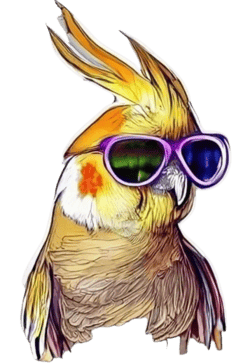Uncovering 10 Surprising Truths about the Cockatiel’s Uncommon: Do Cockatiels eat Bugs?
Introduction
Oh, the cockatiel! This charming bird, native to Australia, is renowned for its amusing temperament and wonderfully vibrant, cheeky nature. It draws us in with its melodic whistles and cute crests, only to make us scratch our heads in perplexity when we dive deep into its eating habits. For those who might still be thinking that these little feathered fellas exclusively munch on seeds—boy, you are in for a surprise! Today, we are delving into an uncharted yet intriguing territory: do cockatiels tuck in on bugs? Yes, you heard it right. Bugs! Let’s hop onto the exciting flight of discovery together, shall we?
Cockatiels and their Insect Consumption in Their Natural Habitat
What’s On the Cockatiel’s Menu – Wild Edition?
Taking a gander at the Australian landscapes where cockatiels hail from, you’ll find a diverse collection of insect life. From crunchy beetles meandering around the antipodes to earthworms burrowing in the rich Aussie soil, these habitats are virtually crawling (pun intended) with potential cockatiel snacks. And do these birds turn up their beaks at this buffet, you ask? Not even close! Wild cockatiels are known to supplement their diets with these little critters, adding a wild twist to their otherwise seed-and-fruit-filled meals.
The Nutritional Value of Insects for Cockatiels
Bugs: The Lesser-Known Cockatiel Superfood?
Turning up our noses at the sight of insects is pretty much ingrained in most of us human folks. But did you know that many insects actually pack a fair amount of nutritional punch? For instance, a mealworm—one favored by cockatiels—contains protein, healthy fats, vitamins (like the oh-so-crucial B12), and minerals. When compared to a cockatiel’s traditional feed of seeds and fruit, insects can provide these feathery friends with a diversity of nutrients that the former just might not cut. And healthier cockatiels mean happier cockatiels, right?
Cockatiels and A Health Hazard?
Navigating The Good, The Bad, and The Bug-ly
While supplementing a cockatiel’s diet with insects can be beneficial, it’s critical to tread carefully. Certain insects may be harmful or even toxic to cockatiels. Plus, ‘wild caught’ critters might carry diseases or pesticides – an absolute no-go for your feathered companions. If you spot signs of lethargy, loss of appetite, or change in droppings after introducing bugs into your cockatiel’s diet, it’s time to hit the pause button and rush to a vet.
Common Bugs and Insects found in Cockatiels’ Diet: Do Cockatiels eat Bugs?
A Bug Buffet – What’s Safe to Serve?
Mealworms, crickets, and even silkworms (if you’re feeling fancy) make up the safe-to-eat insect list for cockatiels. Remember the mantra: ‘preparation is key.’ Always ensure these bugs are bred in confinement (read: parasite-free environment), thoroughly cleaned, and ideally cooked before serving.
Can Cockatiels be Trained to Eat Bugs?
Getting A Bird’s Eye View On Taste Training
Yes, indeed! But, it’s not always a walk in the park—or a flight in the sky, if you will. Introducing insects to a cockatiel’s diet can be a slow and patient process. Start small—perhaps with a juicy mealworm—and observe. The potential upshots, such as a healthier and more varied diet, definitely make the grueling training worthwhile! While some birdies might be open to this culinary adventure, others might raise a wing in polite, or not-so-polite, refusal. And that’s okay too. Always remember, every cockatiel is distinct with its own set of likes and dislikes.
Conclusion
So, there we have it, folks! The end of our enchanting, bug-filled journey exposes the surprising appetite of cockatiels for the six, or eight, legged delights. Like every other aspect of pet care, feeding cockatiels insects calls for a generous sprinkle of caution, the right knowledge, and a dollop of patience. Adventurous cockatiel parents may find this avenue of nutrition interesting, delightful even. Just always remember the golden rule of pet care—an informed owner is a good owner!
If you’re interested in exploring more about the diverse diet of cockatiels and wondering whether they can munch on Brussel sprouts, check out our article on “Can Cockatiels Eat Brussel Sprouts?” for valuable insights into this aspect of their nutritional needs.
FAQs
- What insects can cockatiels safely eat? Mealworms, crickets, and silkworms are generally safe and nutritious insect options for cockatiels.
- How do I prepare insects for my cockatiel to eat? Source them from a reputable seller, ensure they have been bred in confinement and are parasite-free. Cleaning and cooking the insects before serving are recommended.
- Can I train my cockatiel to eat bugs? Yes, with a dash of patience and consistency, you can train your cockatiel to eat bugs. Always keep in mind – slowly but surely does it!
- Are there any health risks to my cockatiel from eating bugs? Yes, if eaten inappropriately or if the insects are disease-ridden, your cockatiel’s health might be at risk. Monitoring and vet consultations are key.
- How often should I feed my cockatiel bugs? There’s no one-size-fits-all answer here. While insects’ nutritional content makes them apt for a weekly treat, it would be wise to consult a vet for a tailored approach.
So, there you have it, folks: Bug-eating, Cockatoo-style! Admittedly, it’s a weird avenue to explore, but then again, there’s so much about life we’re still learning, right? Here’s to the surprising truths about our cheeky cockatiel friends—aren’t they just the absolute chirpiest?

About Me
I’m Kamran, a co-founder and content creator at cockatielhq.com. With 8+ years in the world of avian enthusiasts, I’ve gained extensive knowledge in caring for birds. From egg-laying and mating to cohabitation with other birds, dietary needs, nurturing, and breeding, I’m here at cockatielhq.com to share valuable insights for your avian companions.








One Comment